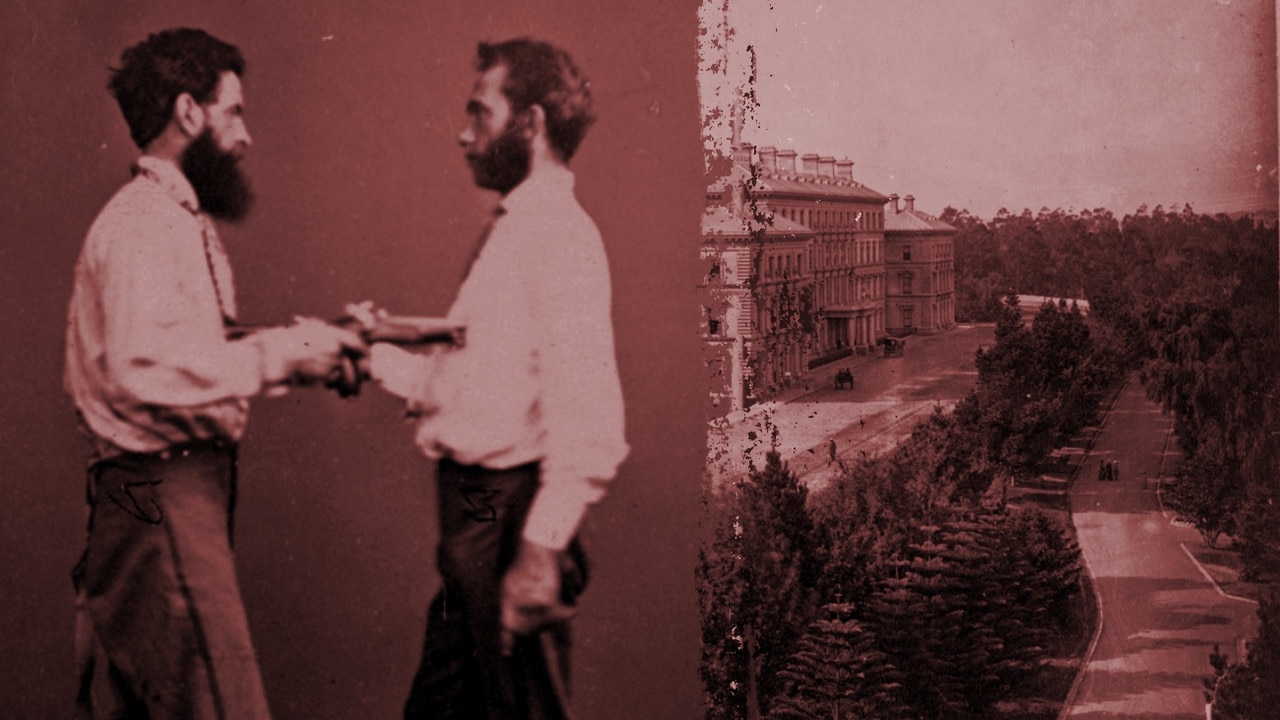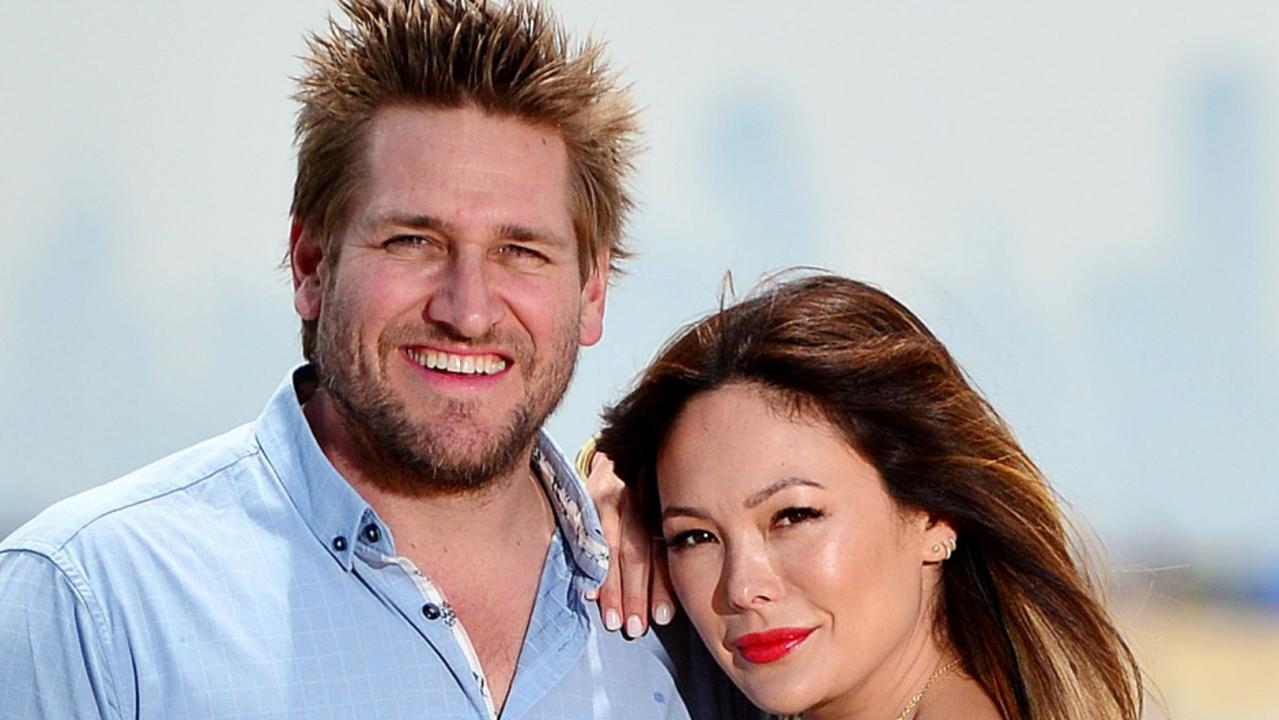Hamish McLachlan walks through Bruce McAvaney’s special career
WHERE do you begin with Bruce McAvaney? Nine consecutive Olympics, 15 AFL grand finals, 26 Australian Opens. Hamish McLachlan catches up with the man who finds the right line for the moment.
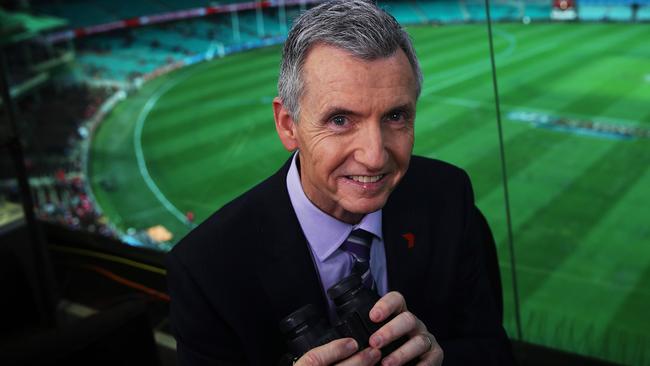
Melbourne
Don't miss out on the headlines from Melbourne . Followed categories will be added to My News.
Bruce McAvaney. Where to begin? Some stats, perhaps.
Bruce, South Australia’s favourite son, has been involved as a host, or caller, in every Summer Olympics since Moscow in 1980. He has called every gold medal of Carl Lewis and Michael Phelps.
He has called Australia’s most iconic horserace on the first Tuesday in November, four times.
He has hosted 18 Brownlow Medal presentations, called 15 AFL grand finals and been involved in 26 Australian Open tennis broadcasts.
He has always found the right line for the right moment.
In 2004, in Athens, on Hicham El Guerrouj: “He goes from the greatest never ... to the best of all time”. Masterful.
He is generous, caring, warm, and officially, the unofficial Captain of Seven’s Commentary Team.
Bruce and I walked and talked for two hours, and I was disappointed when it came to an end.
We spoke about his mispronounced surname, high school failure, the public service, sliding doors, gambling, commentary, his love of numbers, inspirations, impersonators, his greatest moment, his ultimate sporting match-ups, and the pressures of the Rio Olympics.
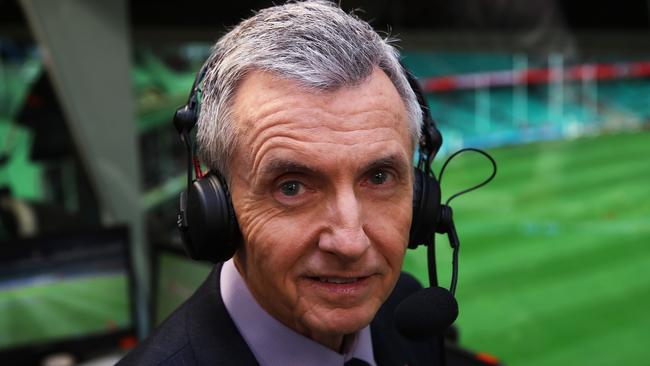
HM: Has Australia been mispronouncing your surname for a while?
BM: Forever, I think. My dear late father used to ask me why I didn’t tell people, and I’ve always said that it wasn’t that important. People say “Macca-vay-knee”, but it’s actually “Macca-vanny”. I’ve been called worse things!
HM: When you introduce yourself to someone who doesn’t know you, which pronunciation do you use?
BM: Macca-vanny. It’s funny, we’re in the game where we try and get people’s names right!
HM: As a youngster, you used to buy the Best Bets racebook on a Friday, sit on the bed with a whip in hand, and make up commentary for the horses. What fascinated you about horse racing over other sports?
BM: Probably my parents, and their affection for it. They took me to Morphettville, and I was actually there for Bart Cummings’ first group one win, which I didn’t know at the time. To see the jockeys, the silks and the horses, it was all just so fascinating. I got to see Tulloch win when I was very young. I wanted to know about Phar Lap. For all of us, those early days are very influential, and they still resonate with me today in my 60s. The other big thing for me was Bill Collins. We were living in Adelaide, so we would only get the races from Adelaide and Melbourne, and his voice and his colouring of the races was inspiring for me, and emphasised it was the sort of stuff I wanted to get involved with.
HM: You played cricket and football at school. Were you a better batsman or bowler?
BM: Better bat. Norman O’Neill was my favourite player growing up; he was probably an unfulfilled talent, but a brilliant fieldsman and a dashing batsmen. I used to bowl leg spin, but I was more of a trundler.
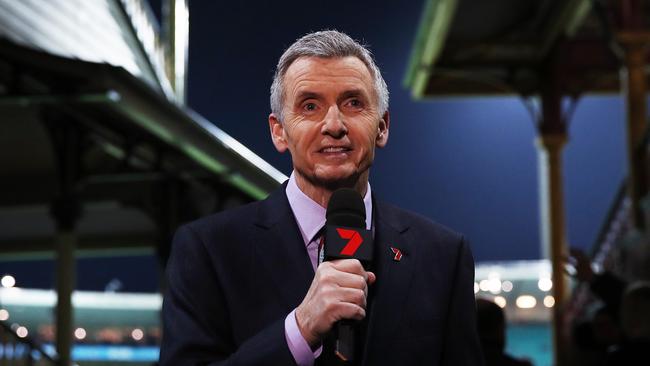
HM: And as a footballer, a good or great player?
BM: You’re making it hard for me to be modest! I wasn’t too bad a player, I guess. I played Under 19s at Woodville. I was captain of both the cricket and football teams at Woodville High, which is something I’m very proud of. I was limited because I wasn’t that tall. I certainly had a lot of fun playing footy over the years, but I wasn’t going to carry on to the top levels.
HM: I believe your coach was Craig Bradley’s father at Woodville?
BM: Lionel Bradley, yes. Craig was our mascot. I always had an interest in Craig’s career. Having known him as such a young fellow, it was great to see everything he achieved. He’s probably the greatest mascot in the history of the game!
HM: Your memory is almost photographic, how is it that you didn’t pass year 12?
BM: I actually failed year 10 as well, and had to repeat, which I did better the second time around as you would expect. Application was the biggest issue, which I’m not particularly proud of. I had a really strange relationship with Woodville High. I was a prefect and captain of a couple of sports sides, but I would get kicked out of class for being disruptive. It was just the way I was at the time. I found it very hard to batten down the hatches and do my homework. I found it difficult to apply myself to anything that I didn’t find interesting. I do remember this from school — it can be very frightening when you don’t know how to do something! After I left school, I went into the public service and did some jobs there where I wasn’t particularly successful. When I’m out of my comfort zone I can unravel, and I think that’s what happened at school.
HM: You worked in the public service?
BM: Yes. My job every morning was to get a big bag and walk a kilometre down the road to the General Post Office, collect all the mail, bring it back, and then deliver it. They probably needed the mail by about 10 o’clock, but I was lucky if I got it out to them by midday. After that I went to Telecom, and got promoted as a clerk. I did that for about four or five years.
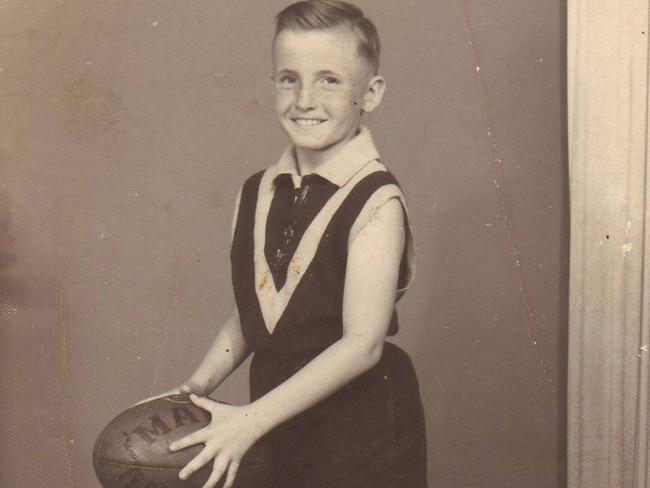
HM: Did your big break come about by chucking a sickie at work?
BM: It did. I wanted to go to the Kilmore Cup to have a bet, which was on a Monday. I flew into Melbourne and I ended up sitting next to Kevin Hillier on the plane; he was a part-time broadcaster, just a wonderful man. We were chatting, and I told him how I’d always wanted to be a race caller. He told me to come out and give him a hand at the trials. That sowed the seed, and it took him about six months to talk me into doing it. The trials were on a Sunday morning, and the riders would wear overalls, there were no silks. It was a fantastic way to hone a skill. I’m not sure what I was like at the beginning, but I did that for a few months.
HM: And from there?
BM: You needed two race callers at Oakbank. 5DN had allowed one of the callers to go away on holidays, and they wanted Kevin to fill in. He suggested to them that I should be given an opportunity. I went to the trots and stood with the 5DN sports director, Merv Thomas. He handed me a microphone, and I had to stand in the middle of the crowd and call the race, which was frightening.
HM: Hell of a nerve-racking audition!
BM: Well, I must have passed the audition because I was then given the opportunity to call some more races the next Saturday. I was living with my parents at the time. I was about 23 years of age and I just couldn’t sleep on that Friday night before Oakbank, but the unbridled joy on the Saturday night — it was just amazing. For me, it’s something that is hard to think about without getting quite emotional.
HM: Did you know at that point that you’d started a new career?
BM: Yes, it just felt so natural to me. For six months I would continue to work in the public service, and call races on nights and weekends. I did feel like everything was going to happen. I had a confidence — not an arrogance as such, but I really believed I could do it. The anxiety in the lead-up is relieved as soon as the headset goes on. That is still the same now as it was back then. It’s funny to say this, but I feel at home when I’m calling: it’s a natural place to be. When the headphones go on, that is when I feel most comfortable.
HM: Just back a little … you sat next to Kevin Hillier on the plane, had you met him before that?
BM: We knew each other, having met at the track a few times. I got to know him extremely well, but sitting next to him on that plane changed my life completely. I don’t think about it a lot, but if I hadn’t skipped work to go and have a bet, I’d probably still be in the public service, trying to get to a retirement stage. I’d still have the same interest in sport, that would never have gone away. The opportunities that have come along with the job have been remarkable. I can’t remember if I won at Kilmore that day!
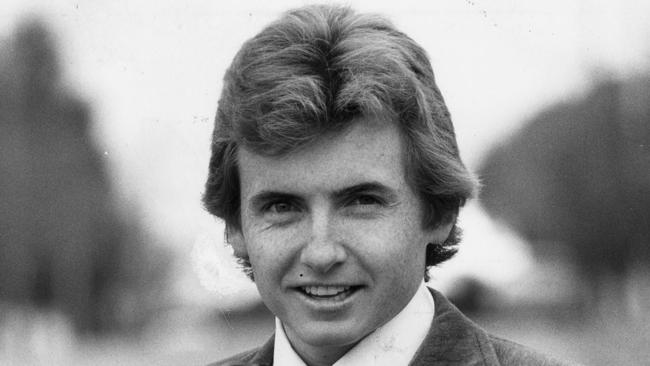
HM: You might not have won money on the track that day, but you couldn’t have won any bigger off it. Were you a winning punter?
BM: I used to keep a record for many years, but like most punters, I don’t think I would want to examine that too forensically! I had winning years and losing years. The challenge for me was — and is — that the more you win, the more you bet. I can remember a big meeting in Cheltenham where I lost five thousand on the Friday night. I won it back on the Saturday afternoon and then lost it again that night. It did get to a point where I realised that gambling was something I would have to control. I never got into debt. I got it under control about 25 years ago. I did occasionally bet beyond my means, and I could have become a problem gambler. I don’t bet very often now; I’ve seen the massive problems it can cause if it gets out of control. I worked out in the end that the pleasure I got from winning was nowhere near the despair I got from losing. Once I worked that out, I was able to get things under control.
HM: Tony Charlton once said: “As a commentator, you are supposed to produce words like bubbles in champagne”. How would you describe your role as a sports broadcaster?
BM: It’s interesting, it’s changed over the years because of television. When I started, it was painting a picture that ignited the imagination of people listening at home. Most people are watching at the same time as you are now, so the role is different. I think it’s important to entertain, but also inform. Hopefully when there’s a big moment you do it justice, and give the people listening and watching a certain feeling of involvement and excitement. You hope to do it in a way that people appreciate and enjoy. As a caller, you despair about getting names wrong, but when a big moment occurs you really do know that that sound bite is going to be there forever. Sometimes it can work for you, and sometimes it will work against you.
HM: Are there times when silence is the best commentary?
BM: There is, it’s television vs. radio a bit. Silence is brilliant. The natural sound of a ball hitting the cricket bat, or the gates opening at a horse race, or the bit in the horse’s mouth — they are evocative sounds. When you go to sports, you listen just as much as you watch. You have to have that confidence to let those moments happen, and let the sport talk. It’s the rhythm of the call, but it is difficult not to overcall.
HM: Along with bringing to life some of the country’s most important sporting moments comes enormous pressure. Do you feel it?
BM: We’ve got a very important sporting moment coming up next month. I do feel the pressure, and it doesn’t get easier, which is strange. You do have to protect what you have done in the past. My reputation has been hard earned, but is not without flaws. There are some people that think I am twice as good the caller as I am, and others that think I’m half as good as I am. The nerves and the anxiety are things that haven’t gone away. I feel it every Friday night to be truthful. I prepare as much as I can to overcome that. When you’re coming to an event like Rio, the prep never ends. You’ve got to back yourself in. It’s part of the challenge, I wish it would go away for me, but I know it never will. It’s probably a bit harder to prepare for the big events now, because there is a fear of failing. For me personally, it would be shattering if I didn’t do a good job in Rio. It’s a hell of a challenge, people might say “turn it up” and think I’m overplaying it, but it really is important for me to do the best I possibly can.
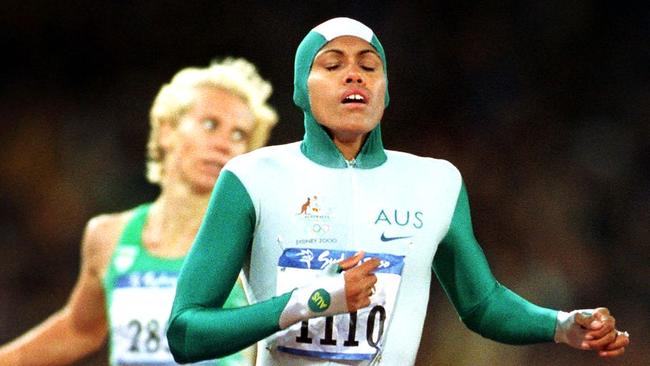
HM: Greg Miles once said something like: “I commentate eight races a day, six days a week. I can do it all perfectly, but if I get the last 15 seconds of the Melbourne Cup wrong, I’ve had a terrible year.” Does that resonate with you?
BM: Completely. I’ve been lucky enough to have called the Melbourne Cup, and the pressure is similar to the Olympics. You can break it down into about four different segments over the race. Technically, it is nearly the most difficult, and in terms of the pressure, it’s an incredible challenge to turn it into a descriptive and emotive call.
HM: Speaking of the Olympics: do you think Cathy Freeman’s greatest moment was also yours?
BM: I don’t know what my best call is, but for me it was definitely my biggest moment. Nothing will come together quite like that again for me, calling in your own country, the big race, the big stadium, the right person. That moment could have broken my career. I had a difficult Olympics in Sydney to be truthful; you would read the papers and hear the criticism. I’m very proud of that call now, but I wasn’t proud at the time. It’s like Raelene said …
HM: What a relief?
BM: That’s all I felt. The whole night was colossal, and Cathy was the diamond in the middle of that night. It was the biggest thing that I’ve been involved with as a broadcaster. Other people will have their moments, and it will be just as big for them, but it was big night, a big moment, and it means a lot to me.
HM: You had an issue just before the race.
BM: I did — my mouth went completely dry just before the race. I had been calling for hours, and then it just went dry. I could hardly talk. I realised a moment had arrived for me. I was sitting alongside Raelene Boyle, who is a great friend. I remember saying to myself: “You’ve done the work, you know how to do this, just relax.” This was real pressure; it was not perceived.
HM: Did you know about Cathy’s suit?
BM: I didn’t. She looked bigger and stronger in that suit. The race started and there was this massive roar. I got to interview Cathy later that night on air — we interrupted a call to do it; Cathy had walked to the commentary position and was standing behind me. That 90 minutes or so is irreplaceable for me.
HM: Your last line, “What a legend, what a champion”, I have been told it irks you. Why?
BM: It does. Looking back, I would rather have said it the other way round: “What a champion, what a legend.” Champions get elevated to legend, not the other way around.
HM: You are a tough marker. If we were talking about your sporting career in terms of Brownlow voting, it seems Cathy gets the three votes. Who gets the two and one for being the most memorable moments you’ve seen or called?
BM: You’re not making this easy for me, are you? I am assuming I can go with moments that I’ve seen?
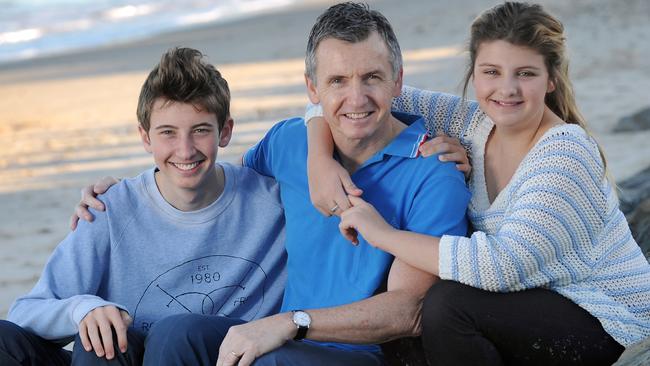
HM: Yep.
BM: Makybe Diva winning a third Melbourne Cup gets no.2. I had spent a bit of time with Lee (Freedman) promoting the cup, and he actually called me after the Cox Plate and told me he was undecided about running her. I think he must have had a few, because trainers don’t normally ring me. He didn’t need my advice, and I didn’t give him any. He summed it up so beautifully after the race. For the one vote I would go with the Sugar Ray Leonard versus Tommy Hearns in Las Vegas, 1981. I was working at Channel 7 in Adelaide, and I wrote a letter to Ron Casey — handwritten, not typed — saying there was a magnificent fight coming up, asking if we could cover the event. He told me we weren’t going to do it, but that he would send me over anyway. In the weeks leading up to the fight, he decided to actually buy it. I got to meet Bob Arum, who was one of the promoters of the event. I got to sit ringside at Caesar’s Palace next to Jimmy Jacobs, and Jake LaMotta was sitting three seats down. Raging Bull had just come out in the cinemas. It was an extraordinary fight. When Ali walked in the place erupted, you can understand why it was so hard for him to give the sport away.
HM: Your recall is astonishing.
BM: My memory is very good on some things, and terrible in others. I’m not sure I can explain it. I think it has a lot to do with your interests in life — sports are definitely mine, so I remember sports pretty well.
HM: Can a good moment become a great moment with the right line? Jesaulenko’s mark is forever linked with three famous words.
BM: You’re right. “Leo Barry, you star” was an amazing moment that Stephen added to. Those moments do become parts of folklore. That’s the challenge for broadcasters: we all have egos and we want to be part of the story. You’ve just talked to me about Cathy Freeman, and I relish the fact that I’m connected with that moment. How lucky am I? As a broadcaster that is what we live for — we do want to be remembered, we do want to say something that is exceptional.
HM: “Kingston Town can’t win”: was it a good or bad call?
BM: An exceptional call, one of Bill’s (Collins) finest moments. To describe it that way, and then suddenly you realise there’s a chance, there is this moment where his voice lifts, and he carries that. It is one of the most brilliant pieces of commentary. It was so right — he couldn’t win, and then the horse proved him so wrong, which made it a perfect call and elevated the moment. If he had said “Kingston Town is struggling”, you wouldn’t have had the same emotions when he won. He made the call, and it made the race brilliant. It actually makes me shiver to think about that call. I’ve listened to lots of callers and tried to learn from them, but Bill was by far the best.
HM: When the big moments arrive, do you have lines already in the back of your head, or is it off the cuff?
BM: It’s generally somewhere in between. I’ve been thinking about Usain Bolt for 12 months, wondering how that might unfold. I’m hoping that he wins because he’ll have done something that no one has ever done before. I believe in him, in his sincerity, and the fact that he is a clean athlete. I hope I’m right — the whole world does. You can’t nail down the line, but you also need to have thought about it. You have to analyse what the moment might mean in your head, and have a sketch of how it might play out. If you overdo it, you’re in big trouble; the result might not come up or it could sound too contrived. It’s like a blank canvas, where we’ve done some sketching, but not coloured anything in just yet.
HM: You do barrack for certain scenarios as a caller?
BM: You do, and that’s unavoidable. You love the champion — how much would we love Federer to win Wimbledon again, or a gold medal for that matter? When I call football I’m neutral, but you do want the underdog to get up. One of the hardest things as a broadcaster is when a great champion is surpassed by another great champion and you’re not ready for it. We’ve seen that in tennis.
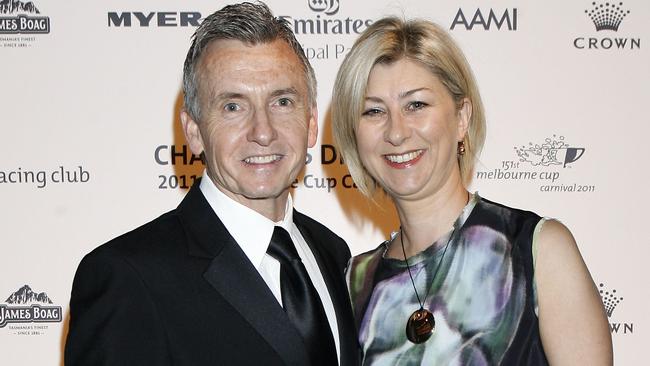
HM: You talked about reading the papers in Sydney, and having a tough time. Criticism is an inevitable part of a public life — how have you managed it?
BM: You do learn to live with it. No matter how hard you try, perfection is impossible. People also have their own way of looking at a broadcast, and they have their own style of commentary that works for them. At the end of the day you can’t satisfy everybody, but you do have to satisfy yourself. You know yourself when you have done a good job or not, and that’s how I deal with it. Some criticisms sting. There are two types of criticism: ones that are well founded, and gee they sting because you’ve let yourself down. The other ones that are so far off the mark and hurtful that they can break you for half a day, but then you forget about them.
HM: Is there one that has affected you more than any other?
BM: Not really, nothing that has lingered. I’ve got a clean sheet, but handling criticism is not easy. You are in a very different stage of your career to me, but you would know what it’s like. Most of us go through a honeymoon where you burst on to the scene; you’re different and people accept you for that. Suddenly, people will find fault and you will fall out of favour, but you come back into favour. You want everyone to love you, but at the end of the day, the only person I want to be happy with my calling is me. It’s more important what I think about my calling than what other people do. That’s the way I work.
HM: When I first met you, you told me four things. One, prepare, you can never over prepare. Two, never wear anything you’re not comfortable in as you will always be distracted. Three, don’t try and be someone else, because all you will be is a lesser version of them — be the best you. Four, you will always come off air unhappy.
BM: I was clearly a wise man when I first met you — I am wearing very comfortable clothes right now. That’s the way it is, they all ring true. There are nights when you go home and realise you’ve done the best that you can do, but I never feel like I’m going to reach my potential, and I want to. That’s what I’m striving to do, it’s still out there. I don’t feel like I’m ever going to be completely satisfied, but there are times when you do know that you’ve done very well, and there wasn’t a lot more that you could do, and that is a great feeling, a real satisfaction. There is a reality check for me after every Friday night when I go to bed, and I think of the things that I could have said, and didn’t.
HM: Has becoming the stats man and the fountain of knowledge in regard to numbers become a rod for your own back? Is it a burden to come up with those numbers when no one else has them?
BM: It’s horrible being a know-it-all, but I do base my calls around facts, it’s my style. It’s quite natural the way I prepare, but it does produce its own pressures. When you get them wrong you do feel devastated. I got a fact wrong in a Grand Final in 1991, and someone wrote me a letter about it. That did hurt and it did teach me a lesson. I’d misread my own handwriting, and that hung around for a long, long time.
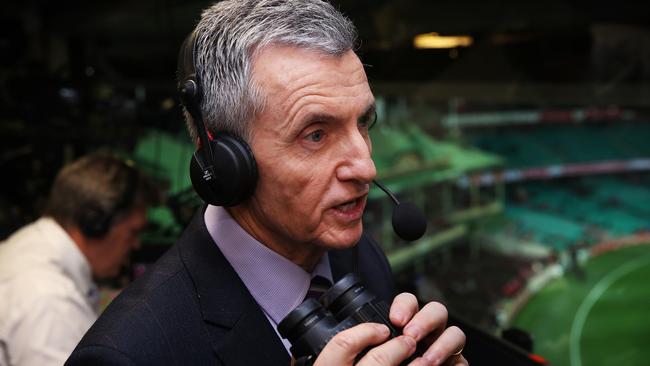
HM: Technology and computers makes things easy, but you still handwrite everything. You have your own journals for every sport.
BM: That’s how I remember and learn; I think I’m stuck with that now. When I first started working I could go the extra yard and get the extra material, but now with all that technology around, well, that has passed me by. I get quite anxious because I can’t find things that others can. For me, the best way is still to prepare with the journal. It’s just what suits my style. It’s a longwinded, tedious process, and it can be numbing, but when I concentrate it sticks.
HM: You have AFL currently; the Olympics are looming; an Australian Open around the corner; and horse racing in the spring. That’s a lot of preparation. How does your week generally look?
BM: Because I don’t do any sports shows, I base my research around just four sports. I have an interest in other sports and keep records, but what I really concentrate on is tennis, horse racing, AFL and athletics. Unless I’m on holidays, I work for a percentage of every day. I have a bit of a system where I go from sport to sport, generally every couple of hours. It’s organised, in a disorganised way.
HM: Your 10th Olympics coming up — how many hours a night do you expect to sleep in Rio?
BM: Probably four or five. We will get home late; you live on adrenaline. I’ve found that after every Olympics, you know you’ve been through something big, and you’re very tired. There won’t be too many nights that I will get eight hours, but that’s just the way it is.
HM: Did the IAAF make the right decision with rubbing Russian athletes out of the Games?
BM: It’s still being played out a bit, but I absolutely think so. I would like in a way that the world record book be burnt now, disintegrated, and start afresh. There are still too many cheats that have their names in the book. It won’t happen, and it’s probably ridiculous in one way, but I’ve often thought that we should start again, have a fresh start.
HM: Do you think it will be a clean group of athletes in Rio?
BM: Not completely. I think individuals will always try and stretch the boundaries, but the one thing you can’t tolerate is a state doping system. The East Germans did it quite successfully. I’m not sure what the numbers were like in 1984 when I first went to the Olympics, but in Seoul in 1988, the number of athletes on drugs was mind blowing, including in the most famous of all events, the men’s 100m. You would hope that of the 10,500 athletes in Rio, there are only a very small percentage who are doping, and you hope they will get caught. You want a level playing field. Sport is about competition, but it is also about health and wellbeing.
HM: Shaun Gallagher: one of the most famous names at Channel 7. Who is he and how did you meet him?
BM: I met him at Flemington in the mid-’80s. I’d gone down to the betting ring, and he called out to me, “Mr McAvaney, Mr McAvaney”. I stopped and spoke to him, and within a few races he’d organised to come and sit with me in the box! He latched on to me, and I latched on to him. For many years I didn’t call things without him being there. He has been front and centre on so many events, and he’s a remarkable bloke that has brought a lot of joy to all of us.
HM: He seems to have a very special place in your heart — more than just an average friend?
BM: He was born with an oxygen deficiency. When I think about him, I think about what he has overcome, and the attitude that he has. His spirit and determination is amazing. What Suzette and her family have been able to do for their son, it shows that nothing is impossible. If you want something, there is a way. He has taken ownership of a lot of broadcasts over the years. He is much loved, and important to all of us. He’s like another brother.
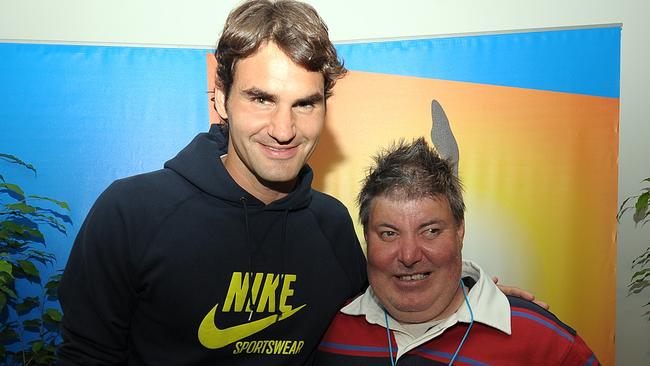
HM: Shaunie met Fed!
BM: Shaunie has met everyone!
HM: If you could give your kids one virtue, what would it be?
BM: Gee … let me think a bit … (long contemplation) … I think enthusiasm is a great attribute; it can take you far, it gives you the right frame of mind. The first thing you want for your kids is health, but you want them to have a joy and optimism for life. Life is a funny thing: as you get older, you realise there are limitations. I want my kids to think there are no limitations.
HM: You are very well read. What is the one book you would recommend to people?
BM: The Razor’s Edge by Somerset Maugham. It’s about Larry, a bloke that goes off and finds peace and wisdom. He ends up becoming a taxi driver. It might not be his greatest book, but for me it is. It was about someone on a journey, which we all go on, finding how to live with themselves, and figuring out how to get their head around what it’s all about. It had a huge influence on me.
HM: Is there a movie that you have watched too many times and will continue to?
BM: The Godfather, I love the layers, the acting was incredible. Brando at the end of his career, Pacino at the start of his. The Godfather I and II are classics. I loved Casablanca too, such a simple movie, but so well done.
HM: What does a day away from work look like for you? What do you do to make you happiest?
BM: Go for a run, have brekkie, spend some time with Annie, have a cuddle, take the dog for a walk, read a good book, have a nice glass of wine. Having great conversations and feeling close to somebody — that’s what I love about life.
HM: We’ve been walking for over an hour, and I think there have been about 55 people saying “hello Bruce”. Do you love being well recognised, or do you miss anonymity?
BM: I like being recognised, but in a natural way. Everyone that we’ve spoken to today — to them I’m not the bloke that was on telly last night, I’m the neighbour who is walking along the beach. I’m in the same boat as they are, enjoying walking along the beach with my dog. I do like being recognised, how could you not? And I like talking to people. My mother was a great interviewer. You’re incredible the way you have found out things about people, but my mum would’ve had you covered. I’m like her, I like to find out about people.
HM: “Special” and “delicious” — it’s funny what sticks.
BM: I could have said worse things. “Delicious”, that was a funny one, and came from nowhere; my kids got hounded a bit at school after I said that. “Special” was about Wayne Carey, so I can’t complain about who I said that about. How honest can you be? Those words have stuck.
HM: Rob Sitch and Andrew Startin have both impersonated you. Amused? Flattered? Offended?
BM: Flattered, generally. That’s business, not personal, even when Sam Newman used to give me a hard time. We all have our idiosyncrasies, and they show mine up better than I do. I have seen Rob’s, and I was amazed how much like me it was; it was a very scary experience to see yourself in someone else’s body. It was all done as good fun.
HM: Is there a sporting event that you haven’t attended but still crave to go to and experience?
BM: The World Cup. It’s not my sport, but it’s the most important sport to the largest number of people in the world.
HM: If you could put together six sports people, past or present, living or dead, for dinner at the McAvaney household, who gets an invite? I don’t want to pre-empt, but I’m betting that Carl Lewis and Roger Federer are in the mix.
BM: You’re right, Hame, they would both be there. Carl would be great in talking about himself, so that would be all right. I would love for Roger to be there as well; he’d have some amazing stories to share. I would love Mohammed Ali to be there, he could probably out-talk Carl. I’m going to throw Billy Jean King in as well, her attitude when she came to Australia was amazing. Look, I certainly can’t go past Bart Cummings … Marjorie Jackson-Nelson as well — she has had an amazing life, and is one of the best talkers I know.
HM: If you could manufacture one sporting event, one matchup, what is it, where is it and who is involved? You can have anybody you want at the peak of their powers.
BM: I think I’d hate to do this because they all champions in their own time and own right, but can you imagine seeing Black Caviar vs. Vain? Or Phar Lap vs. Man-o-War? Maybe Usain Bolt vs. Carl Lewis … times say Usain wins. I’d probably have to go tennis, and say Rod Laver vs. Roger Federer, at Wimbledon.
HM: Can you imagine how great that would be?
BM: It would be amazing. I think I’ve probably seen the greatest matchup ever. I saw it on television. Madison Square Garden, Ali versus Frazier. So I think in many ways, I’ve actually seen what you have asked: two great, unbeaten champions, at their peak, with it all to play for.
HM: Good luck in Rio.
Who do you think would win Bruce’s dream match-ups? Tell us below
The Rio 2016 Olympic Games starts on August 6 on Channel 7, 7TWO, 7Mate & the 7 Olympics app.

